On the first of its two days, the court will hear the oral and written arguments that substantiate the complaints filed against the blockade applied by the United States to stifle Cuba.
The presentations of the witnesses, who will bring forth specific cases of the human and economic impact of the blockade, will be of great value for the judges and prosecutors participating in the process.
The president of the Cuba Coopération France (CubaCoop) association, Victor Fernández, announced to Prensa Latina that during his speech he will point out the pressure on European companies, banks, and citizens so that they may not have ties with Cuba, proof of the extraterritorial component of Washington’s blockade.
Political, scientific and technical presentations will also be made to argue the importance and need for the international court, which, although not binding, will provide a new tool in the global battle for the United States to end its blockade.
The second and last day of the court will feature the judges’ deliberation and their verdict.
Prestigious jurists will intervene in the process, led by the main judge, the expert in International Law Norman Paech.
The president of the Cuban Institute of Friendship with the Peoples, Fernando González, recognized the initiative to hold a court to denounce and judge the US blockade, which he described as criminal.
jrr/jf/wmr










